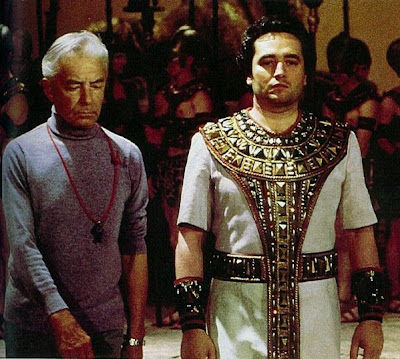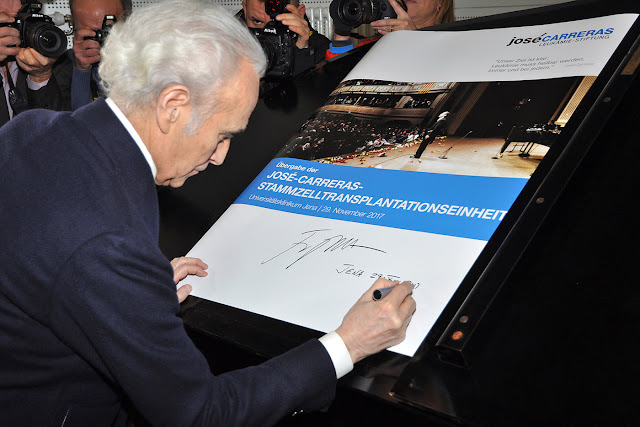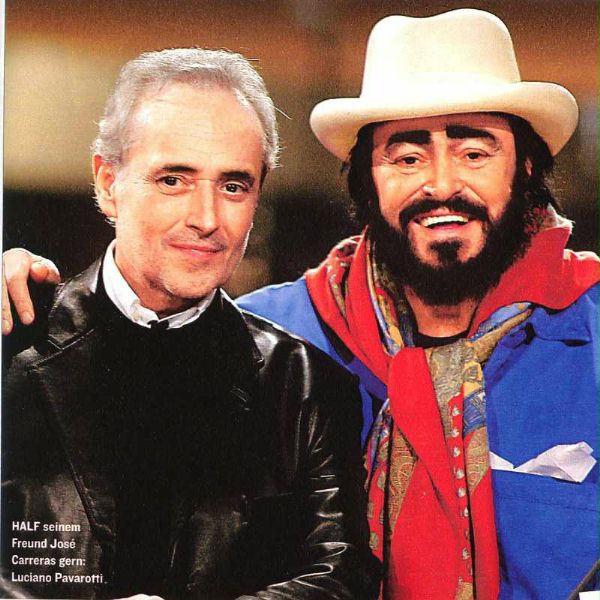"Il Video della Settimana": Josep Carreras and Katia Ricciarelli sing the Final Duet of Aida (Concert in Lugano, 1984)
Benvenuti per un nuovo Video della Settimana.
Ancora opera in questa prima domenica di agosto in occasione del 34esimo anniversario del debutto di Josep Carreras nel ruolo di Radamès nell'Aida di Giuseppe Verdi durante l'edizione estiva del Festival di Salisburgo: era il 26 luglio del 1979. Carreras ha condiviso la scena con Mirella Freni nel ruolo di Aida, Piero Cappuccilli come Amonasro, Marilyn Horne come Amneris, Nicolai Ghiaurov e Ruggero Raimondi. A dirigere la Wiener Philarmoniker non poteva essere che Herbert von Karajan.
 |
| Herbert von Karajan and Josep Carreras during the rehearsals of Aida. Salzburg, 1979. |
Ispirata ad un soggetto dell'egittologo francese Auguste Mariette, Aida è un'opera drammatica ambientata nell'antico Egitto, strutturata in 4 atti su libretto di Antonio Ghislanzoni.
La vicenda riguarda l'amore tra Aida, principessa etiope catturata e ridotta a schiava dagli Egizi, e Radamès, guerriero e capitano delle guardie egizie. A contrastare il loro sentimento vi è un ventaglio di elementi l'amore di Amneris, figlia del Re d'Egitto, per Radamès, ma soprattutto il confitto tra le rispettive patrie, a causa del quale Amonasro, Re d'Etiopia e padre di Aida, cercherà di estorcere informazioni inerenti agli schieramenti egiziani con l'inganno, fattore che comporterà a Radamès la condanna per alto tradimento. Aida, la cui identità nobile era rimasta segreta fino a quel momento, ed eternamente combattuta tra l'amore per il padre e la sua patria, e quello per Radamès che, consegnatosi al sommo sacerdote rifiuta di proclamarsi innocente, si nasconderà all'interno della tomba nella quale l'amato verrà sepolto vivo, decidendo per amore di morire insieme a lui.
La vicenda riguarda l'amore tra Aida, principessa etiope catturata e ridotta a schiava dagli Egizi, e Radamès, guerriero e capitano delle guardie egizie. A contrastare il loro sentimento vi è un ventaglio di elementi l'amore di Amneris, figlia del Re d'Egitto, per Radamès, ma soprattutto il confitto tra le rispettive patrie, a causa del quale Amonasro, Re d'Etiopia e padre di Aida, cercherà di estorcere informazioni inerenti agli schieramenti egiziani con l'inganno, fattore che comporterà a Radamès la condanna per alto tradimento. Aida, la cui identità nobile era rimasta segreta fino a quel momento, ed eternamente combattuta tra l'amore per il padre e la sua patria, e quello per Radamès che, consegnatosi al sommo sacerdote rifiuta di proclamarsi innocente, si nasconderà all'interno della tomba nella quale l'amato verrà sepolto vivo, decidendo per amore di morire insieme a lui.
Il ruolo di Radamès richiederebbe un'analisi molto specifica. Trattandosi di un eroe verdiano viene generalmente associato prevalentemente a un tenore dalla spiccata vocalità eroica, dotato di forza in tutto il registro e soprattutto per sostenere gli acuti che i frequenti momenti di alta tessitura richiesti dalla partitura impongono.
Da questo punto di vista risulterebbe molto difficile immaginare Josep Carreras nei panni di un Radamès ideale. Come è noto, è stato Herbert von Karajan a proporgli di affrontare questo ruolo, intimandolo a non preoccuparsi perché intendeva dare vita ad un personaggio più romantico di quello che era solito rappresentarsi: lo vedeva piuttosto come un amante sensibile.
Certamente il timore di Carreras era più che comprensibile e giustificato, visto che le caratteristiche sopra citate del personaggio non sempre possono essere compatibili con quelle di un tenore lirico: ad ogni modo, a prevalere fu la fiducia riposta nelle intenzioni dello stimatissimo direttore. A questo proposito, Karajan intendeva che al debutto in scena precedesse una registrazione in studio realizzata sempre nel 1979: insieme a Carreras, il cast prevedeva Mirella Freni, Agnes Baltsa, Piero Cappuccilli, Ruggiero Raimondi e José Van Dam. A distanza di tre mesi, l'apertura estiva del Festival di Salisburgo prevista per il 26 luglio. Josep narra i momenti di tensione che precedevano il suo ingresso in scena, tensione aggravata dal fatto che purtroppo il tenore canta praticamente subito, e l'aria che gli corrisponde, la celeberrima Celeste Aida, risulta particolarmente insidiosa in quanto più lontana dalla sua natura vocale. Ad infondergli coraggio lo stesso Karajan e Piero Cappuccilli. Il fatto che Aida sia stata ripetuta durante l'edizione successiva del Festival direi che la dice lunga sul risultato.
 |
| Herbert von Karajan and Josep Carreras rehearsing Aida. Salzburg, 1979. |
Potrei azzardare a dire che per rispettare con estrema fedeltà la natura musicale del personaggio e la sua evoluzione nel corso dell'opera sarebbero necessari tre tenori distinti: uno più eroico per la sequenza iniziale, uno di carattere intermedio per il terzo atto, insidioso per l'alta tessitura e la forte orchestrazione, ed uno lirico puro per l'ultimo. Lo dico perché la tendenza a considerare il ruolo di Radamès unicamente come eroico, oscura l'innegabile verità costituita da altrettanto numerosi passaggi squisitamente lirici che trovano in Carreras un interprete perfettamente a suo agio. In definitiva, non sono affatto del parere che "un tenore lirico non sia adeguato per affrontare Aida": lo ritengo possibile, certamente tenendo ben presente che deve essere dotato di un centro consistente per poter rendere al meglio i risvolti più drammatici e di un registro tale da non ridursi al parlato in quelle frasi in cui Verdi esige una tessitura non propriamente comoda per un lirico.
Ad incidere sulla sfaccettata natura di Radamès non è stato solo Verdi ma anche la tradizione, in particolare il contributo di quei tenori soliti a concludere la Celeste Aida con il Si bemolle in massima potenza, non rispettando così il pianissimo che Verdi aveva previsto. Nemmeno Carreras conclude l'aria in pianissimo, ma complessivamente la sua versione più romantica, più lirica, a me piace... soprattutto nella versione in studio del 1979. È un gusto personale.
In tutto questo oggi non proporrò la così detta aria del tenore. Quello che intendo fare non è discutere la decisione di Josep di includere Radamès nel suo repertorio, né negare il rischio che questa poteva comportare: vorrei semplicemente far notare che Aida non è solo per vocalità eroiche, ma è fatta anche di momenti che trovano straordinaria espressione in un tenore lirico come lui.
Ho scelto una versione particolare: non si tratta della versione in studio (1-2), né delle recite di Salisburgo con Mirella Freni, poiché ammetto di essere rimasta totalmente conquistata da un momento di un concerto che Josep ha cantato insieme a Katia Ricciarelli presso il Palazzo dei Congressi di Lugano nel 1984.
Ho scelto una versione particolare: non si tratta della versione in studio (1-2), né delle recite di Salisburgo con Mirella Freni, poiché ammetto di essere rimasta totalmente conquistata da un momento di un concerto che Josep ha cantato insieme a Katia Ricciarelli presso il Palazzo dei Congressi di Lugano nel 1984.
L'aria che ho scelto è il duetto del quarto atto, La fatal pietra sovra me si chiuse... O terra, addio, nella quale i due amanti si ritrovano sepolti vivi giurandosi eterno amore. Al di là del risvolto drammatico si tratta di un momento di estrema dolcezza. Purtroppo il video non ha inizio con la frase La fatal pietra sovra me si chiuse, ma si avvia con la presa di coscienza del guerriero di non trovarsi da solo nella tomba: qui Carreras, fortemente impressionato, esprime la propria incredulità con vigore. Tutto il recitativo offre attimi di grande emozione e pura bellezza, che si intensificano da quel "Morir sì pura e bella", a tratti squisitamente soavi, a tratti poderosi. In questi momenti l'espressività di Josep si sposa alla perfezione grazie all'elegantissimo fraseggio e al suo solito buon gusto interpretativo, senza nulla togliere a Katia Ricciarelli che offre un'interpretazione molto corretta ed emotiva che ho particolarmente apprezzato.
Non si può fare a meno di notare ancora una volta che il suo modo di trascinare alcune consonanti risulta sempre di fascino irresistibile. Con il "O terra, addio" l'atmosfera si fa ancora più toccante e l'emozione raggiunge il suo culmine: i due interpreti intrecciano le loro voci ed è solo la tenerezza della loro unione ad addolcire il dramma che i loro rispettivi personaggi stanno vivendo. Inizialmente troviamo due Si bemolle resi con il forte, e sul finale ritroviamo la stessa nota ma questa volta in un pianissimo straordinario, una chiusura insolita per un'opera maggiormente ricordata per la sonorità delle trombe, ma sicuramente di fortissimo impatto. Godetevelo!!
Spero abbiate apprezzato la mia risposta di oggi. L'appuntamento è per domenica prossima con un nuovo video. Buona settimana a tutti!!
Key facts:
Welcome to a new Video of the Week.
Again Opera on this first Sunday of August on the occasion of the 34th anniversary of Josep Carreras' debut in the role of Radamès in Giuseppe Verdi's Aida during the summer edition of the Salzburg Festival: it was on 26 July, 1979. Carreras shared the stage with Mirella Freni in the role of Aida, Piero Cappuccilli as Amonasro, Marilyn Horne as Amneris, Nicolai Ghiaurov and Ruggero Raimondi. Nobody but Herbert von Karajan conducted the Wiener Philharmoniker.
Inspired by a work by French Egyptologist Auguste Mariette, Aida is a dramatic opera set in ancient Egypt, composed of 4 acts with libretto by Antonio Ghislanzoni. The story concerns the love between Aida, the Ethiopian princess captured and reduced to slave by the Egyptians, and Radamès, the Egyptian warrior and captain of the guard. There is a range of elements contrasting their love: the love of Amneris, daughter of the King of Egypt, for Radamès, but especially the conflict between their respective homelands, because of which Amonasro, King of Ethiopia and Aida's father, will try to get informations about Egyptians line-up by cheat, a factor that will lead Radamès to be condamned for high treason. Aida, whose noble identity was kept secret until now, and eternally torn between her love for her father and her country, and her love for that Radamès who had surrendered the high priest refusing to proclaim himself innocent, will hide herself inside the tomb in which her beloved one was to be buried alive, deciding to die with him for love.
The role of Radames requires a specific analysis. Being a Verdian hero, it is generally associated mainly to tenors with heroic kind of voice, with forza in all the range and especially to support top notes that frequent moments of high texture of the score require.
From this very point of view, it would be very difficult to imagine Josep Carreras in the shoes of an ideal Radamès. As is well known, it was Herbert von Karajan who had offered Carreras the chance to face such role, suggesting him not to worry because he wanted to give life to a more romantic character than what whas usually staged: he rather regarded him as a sensitive lover.
Certainly, Josep Carreras' fear was more than justified, as the above-mentioned features of the character can not always be compatible with those of a lyric tenor: in any case,what prevailed was his confidence towards his esteemed conductor. In this regard, Karajan wanted his debut on stage to be preceded by a studio recording they made 3 months before the opening of the Salzburg Festival: along with Carreras, the cast included Mirella Freni, Agnes Baltsa, Piero Cappuccilli Ruggiero Raimondi and José Van Dam. Josep Carreras shared his memories of such tension that preceding his entrance on stage, mostly due to the fact that unfortunately the tenor sings almost immediately the famous Celeste Aida, that is particularly insidious as it is slightly distant from the nature of his voice. Both Karajan and Piero Cappuccilli inspired him courage. The fact that Aida was repeated during the next edition of the Festival actually says a lot about the successful result.
I might dare to say that, in order to comply the musical nature of the character and its evolution throughout the opera, we need three different tenors: one heroic for the opening sequence, one intermediate for the third act for the insidious high texture and strong orchestration, and a pure lyric tenor for the last part. I say that because the common tendency to consider the role of Radames as purely heroic, does not take enough into account the exquisitely lyrical passages that find in Carreras an interpreter feeling perfectly at ease. Ultimately, I am not of the opinion that "a lyric tenor is not adequate to sing Aida": I think it is possible, of course with a powerful center to express well enough the most dramatic phrases, and with a range that does not reduce into speech those sentences in which Verdi planned a not exactly convenient texture for a lyric tenor.
What affected the multi-faceted nature of Radamès was not only Verdi but also the tradition, in particular the contribution of those tenors who are used to top off Celeste Aida with an all power B-flat, so not respecting the pianissimo that Verdi had planned into the score. Not even Carreras sang it in pianissimo, but I have to say that I like his romantic/lyric version... especially in the studio version of the 1979. It is a personal taste.
However, I am not going to propose the so-called tenor aria today. What I want to do is not to discuss Josep's decision to include Radamès in his repertoire, nor deny the risk that this could lead to: I would simply like to point out that Aida is not only for heroic tenors, as it is also made up of moments that find extraordinary expression in a lyric tenor like him.
I chose a particular version: it is neither the studio recording (1-2) ,nor the Salzburg performances with Mirella Freni, since I admit that she had been particularly conquered by a moment of a concert that Josep sang along with Katia Ricciarelli at the Palazzo dei Congressi in Lugano in 1984.
The aria I have choses is the duet of Act IV, La fatal pietra sovra me si chiuse (The fatal stone closed over me ... O earth, farewell), in which the two lovers find themselves buried alive vowing eternal love. Beyond the dramatic aspect it is a moment of extreme sweetness. Unfortunately, the video does not begin with the phrase La fatal pietra sovra me si chiuse, but it starts with the warrior's awareness that he is not alone in his grave: here Carreras, strongly impressed, expresses his incredulity with particular vigor. All the recitative offers moments of great emotion and pure beauty, particularly starting by the "Morir! 'sì pura e bella" (To die! So pure and pretty), sometimes exquisitely sweet, sometimes powerful ones. In these moments Josep's expressive talent perfectly matches with such elegant phrasing and his usual good taste in his interpretation, and Katia Ricciarelli offers a very correct and emotional interpretation as well, I particularly appreciate her rendition too.
One can not help but notice once again the charming way he sometimes drags some consonants: he's so charming! With the last part, "O terra, addio" (O earth, good-bye) the atmosphere is more and more touching, and the excitement reaches its climax: the two performers weave their voices together, and it is only the tenderness of their union what actually softens the drama their respective characters are experiencing. Initially, there are two B-flat they both sings forte, and then we find the same note in the finale, but this time with an extraordinary pianissimo, probably a closing a little bit unusual for an opera which is most regarded for the trumpet sound, but it certainly creates a very powerful impact. Enjoy it!
I hope you have appreciated my proposal of today. I am very sorry for being so late!! See you next Sunday with a new video. Have a nice week!!
The aria I have choses is the duet of Act IV, La fatal pietra sovra me si chiuse (The fatal stone closed over me ... O earth, farewell), in which the two lovers find themselves buried alive vowing eternal love. Beyond the dramatic aspect it is a moment of extreme sweetness. Unfortunately, the video does not begin with the phrase La fatal pietra sovra me si chiuse, but it starts with the warrior's awareness that he is not alone in his grave: here Carreras, strongly impressed, expresses his incredulity with particular vigor. All the recitative offers moments of great emotion and pure beauty, particularly starting by the "Morir! 'sì pura e bella" (To die! So pure and pretty), sometimes exquisitely sweet, sometimes powerful ones. In these moments Josep's expressive talent perfectly matches with such elegant phrasing and his usual good taste in his interpretation, and Katia Ricciarelli offers a very correct and emotional interpretation as well, I particularly appreciate her rendition too.
One can not help but notice once again the charming way he sometimes drags some consonants: he's so charming! With the last part, "O terra, addio" (O earth, good-bye) the atmosphere is more and more touching, and the excitement reaches its climax: the two performers weave their voices together, and it is only the tenderness of their union what actually softens the drama their respective characters are experiencing. Initially, there are two B-flat they both sings forte, and then we find the same note in the finale, but this time with an extraordinary pianissimo, probably a closing a little bit unusual for an opera which is most regarded for the trumpet sound, but it certainly creates a very powerful impact. Enjoy it!
I hope you have appreciated my proposal of today. I am very sorry for being so late!! See you next Sunday with a new video. Have a nice week!!



Comments
Post a Comment
Recent comments